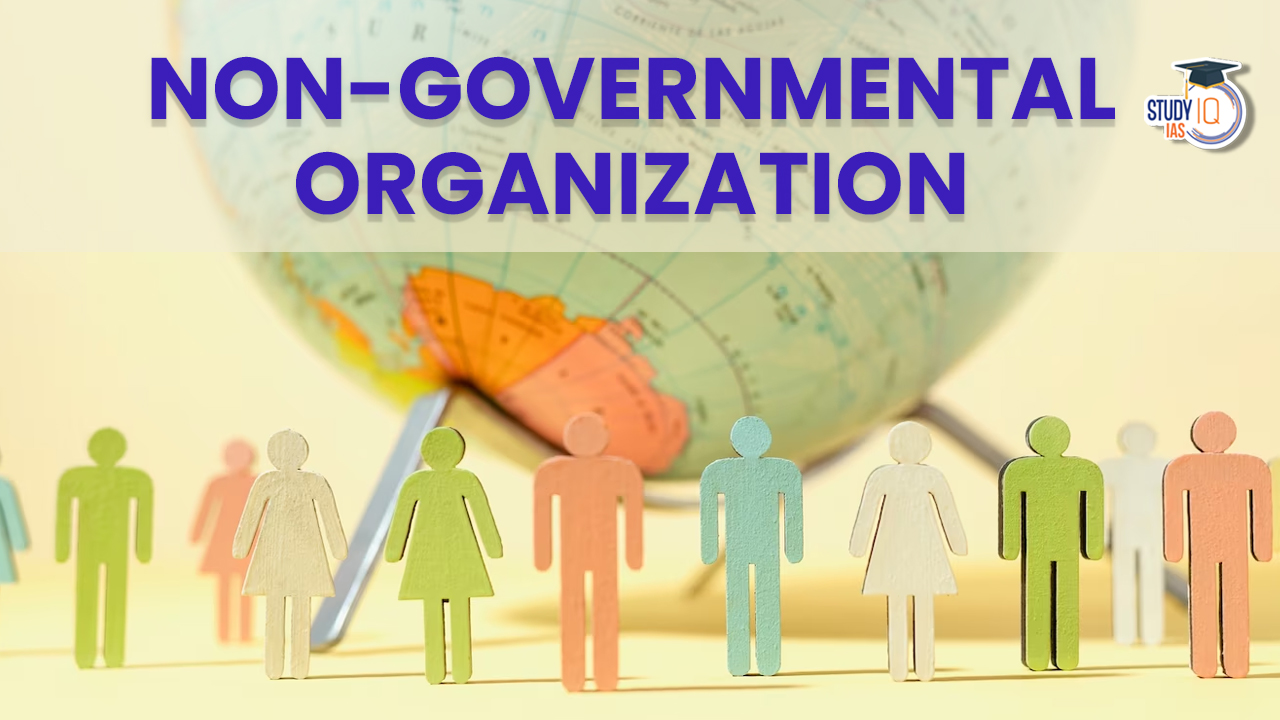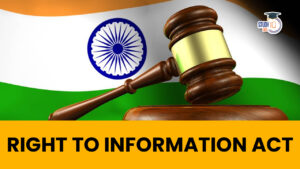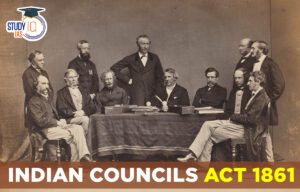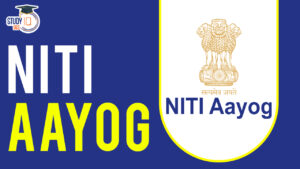Table of Contents
Non-Governmental Organisations
Non-Governmental Organisations are legally recognised non-profit organisations that work to promote social justice and the greater good. They have established a significant place in civic society. NGOs have advanced their development efforts with government support by concentrating on particular issues including poverty reduction, casteism and discrimination, women’s rights, child labour, rural development, environmental challenges, and so on.
The Non-Governmental Organisation is an important part of Indian Polity which an important subject in UPSC Syllabus. Students can also go for UPSC Mock Test to get more accuracy in their preparations.
Non-Governmental Organisation Concept
Non-Governmental Organisations (NGOs) are nonprofit groups that aim to reduce suffering, advance the interests of the underprivileged, safeguard the environment, offer fundamental social services, address human rights issues, or support local development. In India, the term “NGO” refers to a broad range of organisations that may be non-governmental, quasi-governmental, or semi-governmental, volunteer or not, etc.
These organisations are registered under the Societies Registration Act of 1860, have a legal existence, and are not a part of the government. Non-governmental organisations (NGOs) may get money from a variety of sources, including governments, foundations, corporations, and private citizens. NGOs are essential for society’s advancement, community enhancement, and the encouragement of citizen participation.
The three primary categories of NGOs in India are societies, trusts, and charity corporations. Over the past two decades, NGOs have become more significant in the growth of the social sector, including education, health, and other areas.
Non-Governmental Organisation History
The idea of voluntary associations initially appeared in Indian society with the start of social reform movements in the first half of the 19th century. The idea of dedicating one’s life to assisting the most disadvantaged people of society was ingrained by reform movements. These movements recognised the rights of women and untouchables.
The advent of institutionalised reform movements led to the emergence of organisations like Brahmo Samaj, Arya Samaj, Ramakrishna Mission, and others in the second half of the nineteenth century. As a result, the Societies Registration Act of 1860 was passed by the government. Effective efforts were made between 1900 and 1947 to channel the spirit of voluntarism into political action and widespread mobilisation in order to defeat the oppressive colonial power.
Numerous volunteer organisations were engaged in nation-building throughout the post-independence period. Voluntary associations quickly grew as a result of the switch to neoliberal economic and political planning.
Also Read: Civil Society
Non-Governmental Organisation Constitutional Provision
Article 43 highlights the goals of the state and its intention to support rural cooperatives. Article 19 (1)(c) deals with the freedom to form associations. Charitable institutions, charity, religious, and charitable endowments, and religious songs institutions are all listed under Entry 28’s Concurrent List.
Non-Governmental Organisation Role
Social safety Role
The main platform for communities to express their issues is through NGOs. NGOs are essential in drawing public attention to societal issues and problems. NGOs support development, which calls for the equal participation of all people.
Improving the performance of the government
By ensuring that the government is responsive to all citizens, NGOs can increase the scope of government accountability. By bringing their own independent knowledge and research teams to the platform, they also promote the flexibility of policy.
Through the participation of locals, they improve the effectiveness of service delivery at the local level. Because the Comptroller and Auditor General (CAG) takes into account reports and social audits by non-governmental organisations (NGOs) when producing their reports, they also improve policy monitoring and assessment.
Service Role
A flexible method for people concerned about a social or economic issue to start acting is provided by the non-profit sector. NGOs support effective dispute resolution.In the international arena, track II diplomacy (which includes non-governmental organisations) is essential for creating an atmosphere of trust and confidence. Organizing lectures, seminars, focus groups, and awareness campaigns.
Women empowerment
The most vulnerable group in society are women. More women are participating actively in society and fighting for their rights.
Education
NGOs are aggressively promoting education, especially among the community’s impoverished members.
Environmental awareness
Thousands of non-profit organisations aim to educate the public and governments about resource depletion and environmental deterioration, for example. NGO Vanashakti.
Rehabilitation
Many times, especially in rural areas, some groups of people have been forcibly relocated as a result of projects like building dams, building highways, and building railroads. NGOs are crucial to the cause of population displacement and are making significant contributions in this field.
Protecting dignity
In restoring the dignity of marginalised and oppressed communities, non-governmental organisations (NGOs) are crucial. For instance, protecting women who experience prejudice due to their gender, race, or religion would uphold the dignity of women.
Human rights protection
In India, non-governmental organisations (NGOs) play a significant role in advancing human rights and raising awareness. Recognition of gay and transgender people’s rights would not have been achievable without the relentless efforts of civil society organisations.
Community Participation
The non-profit groups provide different viewpoints and, more crucially, the ability to engage meaningfully with communities, especially those who are underprivileged. They support freedom, diversity, and plurality. NGOs are aggressively promoting education, especially among the population’s underprivileged segments. In order to shape global environmental policies, NGO’s collaborate with governments and internal intergovernmental groups on a global scale.
Non-Governmental Organisation Need
India’s economy has had amazing progress since independence, with improvements in healthcare, education, eradicating poverty, and general level of living. Women, children, and marginalised communities continue to be excluded from the development process, which is still a problem. The expansion of Naxalism, recurrent violence in reservations, and an increase in farmer suicides are only a few of the negative effects of unequal growth.
According to the UNDP’s 2020 Human Development Index, India is ranked 131st out of 189 nations. According to the Global Hunger Index for 2020, 14% of Indians are undernourished. The country’s child stunting rate was 37.4%, according to the report. India was ranked 94th out of 107 nations in the index.
In such circumstances, civil society is essential in raising awareness of people’s issues and ensuring that minorities are not overlooked. The civil society must participate constructively and cooperatively in the states numerous programmes and initiatives for development. Non-governmental organisations (NGOs) play a crucial role in the social development processes as the operational arm of civil society.
Non-Governmental Organisation Advantages
Having the freedom to try new things: Speaking up for others on both a representational and independent basis for social progress. To mobilise citizens, media campaigns and other types of action are deployed.
Being adaptable to local circumstances: Serving as a bridge between various sectors and organisations. Serving as a facilitator and mediator.
Good communication skills: NGOs have a significant role to play in the rehabilitation of people, as well as in restoring the integrity of the impoverished and marginalised, as well as in the protection of human rights, through research, analysis, and public education.
NGOs have accelerated their development efforts with government backing by focusing on topics like poverty alleviation, women’s rights, child labour, casteism and discrimination, rural development, environmental issues, etc.
NGOs make ensuring that the government is accountable to the people, which improve government performance. They make sure that the government is nonsectarian and inclusive. By offering impartial knowledge and research, they encourage flexibility and innovation in policy. They are also in charge of observing and assessing government initiatives. The Comptroller and Auditor General (CAG) incorporate NGOs’ reports and social audits when creating its reports.
Non-Governmental Organisation Laws and Regulations
Foreign Contribution (Regulation) Act (FCRA), 2010
The FCRA legislation governs foreign funding of nonprofit groups in India, and the Ministry of Home Affairs is responsible for its implementation. The act guarantees that receivers of contributions from abroad use their funds for the intended purpose. Annual reports from NGOs must be submitted to the MHA. They are required to disclose the amount of foreign contributions received, their source, how they were acquired, their intended use, and their intended use.
The government has the right to fine NGOs that don’t follow the FCRA’s rules. For instance, the government may issue a show-cause notice and subsequently suspend or cancel non-governmental organisations’ foreign finance licences if they fail to submit annual returns. The government amended the Foreign Contribution Regulation Act of 2010 (FCRA, 2010) in 2016 to remove donations from foreign companies (with a 50% ownership) to non-profit organisations, political parties, candidates for public office, publications, employees of the government, and other entities from the definition of a foreign source.
Foreign Exchange Management Act, 1999
aims to reform and reorganise the foreign exchange law. The act’s goals include facilitating international trade and payments and encouraging the steady growth and upkeep of India’s foreign exchange market.
In order to bring all NGOs that receive foreign donations under one roof for better monitoring and management of the funds, the Ministry of Finance handed its regulatory jurisdiction over NGOs to the FEMA in 2016. This was done to guarantee that only one custodian would monitor the flow of foreign money to these entities.
Non-Governmental Organisation Issues Associated
Since it can be very difficult to tell if an organisation was founded to work for a cause or just to receive government funding, accreditation continues to be a major challenge. The ability of NGOs to criticise the government is weakened by their excessive reliance on government funding.
NGOs are frequently seen to be fronts for extremist causes and have in the past served as a cover for organised crime. NGOs with foreign funding have organised agitations and derailed development initiatives in India. NGOs are frequently perceived as encroaching on centuries-old customs and cultures of the populace, which at times sparks widespread resistance. Ban of Jallikattu following PETA’s PIL is one such instance.
Non-Governmental Organisation UPSC
A group of people who care about the welfare of people, animals, human rights, and various other issues can form an NGO. They are non-profit organisations that rely on volunteers to carry out their specific missions. NGOs play a significant role in society.
One of the key themes in the UPSC syllabus’s Governance part is non-governmental organisations, or NGOs. It is advised that hopefuls read extensively and comprehend the purpose and use of NGOs. Both the UPSC Mains and UPSC Prelims may contain questions based on the static section of this topic. Students can read all the details related to UPSC by visiting the official website of StudyIQ UPSC Online Coaching.


 Right To Information Act, Objective, Fea...
Right To Information Act, Objective, Fea...
 Indian Councils Act 1861, History, Provi...
Indian Councils Act 1861, History, Provi...
 NITI Aayog Report on India’s Hand and ...
NITI Aayog Report on India’s Hand and ...





















